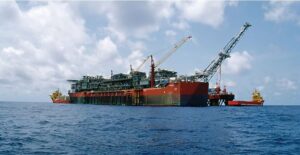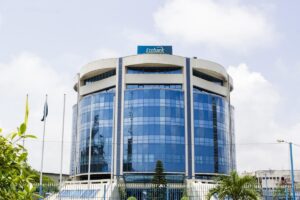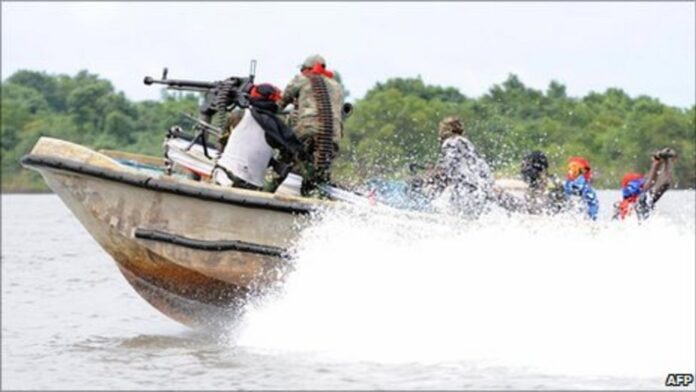Financial analysts have advised Ecobank Nigeria to adopt Corporate Workout Plan that allows talks with Vigeo on ways to resolve pending debt instead of blackmailing its customer.
Vigeo Limited says it has paid $16m out of the $17.1m loan and over N2.1 billion on the naira loan. Restructuring of the outstanding principal and suspension of interest accruals are recommended following the impact of Bonga Oil field attacks on Vigeo’s operations.
This seems better option than blackmailing a credible company that suffered major loss during when the Niger Delta militants attacked its vessel.
Vigeo Limited has for years remained one of the top firms in the oil and gas sector of the Nigerian economy. The company not only fulfilled its obligations to its creditor banks, but also to its customers. That was until unexpected happened , when its offshore support vessel, MV Vigeo Olufunke, alongside the Bonga Oil field was attacked by Movement for the Emancipation of the Niger Delta (MEND) militants.
The MEND attack on Bonga Oil field led to the stoppage of oil production at the Niger Delta by Shell Petroleum. It also stopped the operations of MV Vigeo Olufunke, which operated with over $17.1 million loan and N750 million loan from Oceanic Bank which was later acquired by Ecobank.
The loan was fully performing, with $16m out of the $17.1m loan and over N2.1 billion on the naira facility paid to Ecobank. Still, Ecobank continues to exaggerate the loan outstanding payment to over $16.87 million, portraying the customer as an unwilling debtor .
Royal Dutch Shell’s Bonga oil platform attack

The first of its kind attack on the offshore Shell oil platform in the Bonga field which lies some 120 km (75 miles) off the coast and has a nameplate capacity of 220,000 barrels per day, forced the Anglo-Dutch giant to stop output from the $3.6 billion facility, leading to production shut down which affected the operation of MV Vigeo Olufunke.
MV Vigeo Olufunke was relocated to an European dry dock facility for repairs. The exercise (dry docking and repairs) cost Vigeo Limited well over $5 million. Despite this challenge, Vigeo Ltd made efforts to service its outstanding loans. When the repairs and drydocking were completed the vessel returned to Nigeria to resume operations. Subsequently, the facilities were restructured with monthly repayments being made on both facilities by Vigeo.
Vigeo to date had made a total repayment of approximately $16m on the USD loan (loan amount of $17.1m) and over N2.1bn on the Naira loan (original amount was N750m). Despite these huge repayments, Ecobank still computed Vigeo’s indebtedness to it at $16.87m and N862m on the USD and Naira facilities respectively. The huge loan balances led to Vigeo requesting for an audit of the loan positions in order to determine the true position of things.
However, while Vigeo was engaging Ecobank on the issue of outstanding balances, Ecobank demanded full repayment of the loan and called the personal guarantee given by the Chairman of Vigeo.

Views from Analysts
Analysts have advised that Ecobank changes its approach to the loan recovery and engage the customer for peaceful resolution.
Dr. ‘Biodun Adedipe, Chief Consultant, B.Adedipe Associates Limited, said the best practice is for the bank to separate between principal and capitalized interest.
“There is need for the bank to compute how much it has received in the life of the transaction from Vigeo Limited and how much is left for the principal amount to be completed. The bank should also consider the circumstances, under which the loan went bad”.
He said the amount the borrower is able to afford based on the present circumstance and how soon the customer will be able to pay should also be put into consideration as well as the capitalized interest the bank should waive.
Adedipe said the bank should waive part of the capitalized interest and focus on the principal amount because of the circumstance the business incurred losses was clear to all concerned.
“Our firm handled similar transaction in the past, and it worked perfectly. The benefit is that both parties can still continue business in the future,” he said.
He advised the bank to identify a portion of the capitalized interest, that it wants to forgo, and do that.
“If you want to get all the funds, and its not possible, there will be problem. The best option is to enter into Corporate Workout Agreement, and in the future business will continue. Blackmailing a customer is not a global best practice. In the case of Ecobank and Vigeo Limited, the reason for the business loss was clear. I advise both parties to enter into Corporate Workout Agreement and get the matter resolved in the interest of all,” he said.
Also speaking, President, Bank Customers Association of Nigeria (BCAN), Uju Ogubunka, said the customer had no control over the calamity that befell its business due to attack on Bonga Oil field.
“Both the bank and the customer should appreciate what has happened and find a way out that is beneficial to both parties. This is not the time to blackmail a customer, but engage in genuine dialogue. There should be interest moratorium on the account to enable the customer focus on the principal amount,” he advised.
According to Ogunbuike, who was former Registrar, Chartered Institute of Bankers’ of Nigeria, the bank should write off the capitalized interest. “The bank should be able to say, it cannot win all the time and grant the borrower a waiver. There should be negotiation with the bank, especially as the cause of failure is well known,” he said.
He said the business failure might be an act of God, hence the need to handle the crisis in a way that the bank and business do not suffer.
Ogunbuike disclosed that one of the reasons that a bank might want to have all the money paid in a clear case business loss, is if the bank is going distress.
“Unless the bank is having a distress position, there was no need to insist that all the funds must be paid. Taking such decision could indicate problem with the bank. And it is not the right thing for the bank to blackmail its customer,” he said.
In uncertain times, there is always way to ensure that businesses survive, including granting forbearance. The Central Bank of Nigeria (CBN) Director, Financial Policy and Regulation Department, Chibuzo Efobi, recently granted regulatory forbearance for the restructuring of credit facilities impacted by Covid-19.
In a circular to all banks and other financial institutions dated March 15, 2022, Efobi extended five per cent per annum interest rate on all CBN intervention facilities for one year. The loans were previously priced at around nine per cent per annum. The policy took effect retrospectively from February 28, 2022. This was meant to cushion the effect of the pandemic on businesses and drastically reduce the chances of credit default.
Analysts said debt recovery is challenging and cumbersome, adding that the effort that goes into recovering debts are better channeled into peaceful settlement that allows mutually beneficial business to continue.
Former Executive Director, Keystone Bank and Founder of Richard Obire & Associates, Richard Obire, opined that different banks would approach the Ecobank vs Vigeo debt issue differently depending on the values of the institution.
For him, when a bank lends to a customer, the customers’ willingness and ability to pay are two major considerations for granting the loan in the first instance.
He said Vigeo’s ability and willingness to pay would have been established by Ecobank before granting the loan. “These were either established through previous business transactions with the bank, or same credible transactions carried out by the company with other banks, which Ecobank relied on to take the loan decision. That simply meant that Vigeo had both the willingness and ability to repay the loans, until something beyond its capabilities happened,” he said.
He said Vigeo showed this attribute by paying over $16m out of the $17.1m loan and over N2.1 billion on the naira loan, adding the he expected Ecobank to sit down and discuss way out with the customer.
“The exogenous factors that changed the repayment plan were not within the control of the customer. I expected Ecobank to sit down with the customer and discuss how best to handle the situation. Paying $16m out of the $17.1m loan and over N2.1 billion on the naira loan amount represents substantial performance of the loan,” he said.
Continuing, Obire said aside suspending interest accruals on the account, the bank should restructure the outstanding principal amount, knowing fully well how and why the loan went bad.
“Legally, the bank can say it did not go into equity relationship with the customer, but only carried out a lending transaction, hence the need to get all the funds, including interest accruals, but such move is not ethically right.
“Both parties should reach an accommodation that allows long-term relationship to continue, rather than painting the customer as an unwilling debtor.
“If the bank continues to paint the customer as an unwilling debtor, it is signaling to other banks not to do business with the customer, a practice that is not right,” he said.



